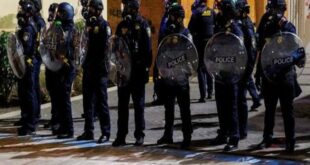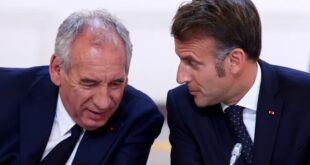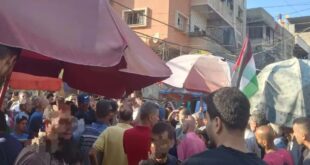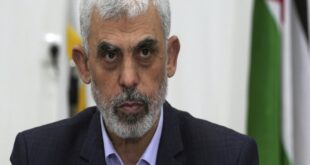
In recent months, Europe has watched impotently from the sidelines as Alexander Lukashenko brutally reasserted his illegitimate authority over the population of Belarus. The protest movement that threatened the survival of his regime after fraudulent 2020 elections has, for the time being, been subjugated: a combination of state violence, media suppression, incarceration and torture has battered a people into temporary submission.
The modest sanctions imposed by the European Union and the United States have had limited effect, while deepening the dependency of “Europe’s last dictator” on Vladimir Putin’s largesse and goodwill.
Calibrating a response to state repression that will not play into Mr Putin’s hands has not been easy. But for the EU in particular, Monday’s extraordinary abduction of Roman Protasevich, an opposition journalist based in Lithuania, must be the catalyst for a stepchange in strategy. Along with his girlfriend, Mr Protasevich was abducted from Ryanair flight FR4978, which was crossing Belarusian airspace while flying from Athens to Vilnius.
It appears he was followed onto the commercial flight by members of the Belarusian KGB. Passengers have reported Mr Protasevich’s panic and terror as the flight was diverted to Minsk on spurious grounds, accompanied by a MiG-29 fighter jet. The opposition movement’s main figurehead, Svetlana Tikhanovskaya, has said that he may face the death penalty.
The abduction of an opposition blogger from a commercial Ryanair flight sends a chilling message to dissidents. The west’s response must be swift and robust
The effect on other Belarusian dissidents will be chilling. Ms Tikhanovskaya, currently exiled in Vilnius but a frequent traveller across Europe, took the same route a week earlier, after speaking in Greece. With Minsk more or less under control, Mr Lukashenko has begun to pick off prominent opponents still at large. Last month, his former spokesman, Alexander Feduta, who had joined the opposition movement, was detained in Moscow and taken back to Minsk, where he has been charged with trying to organise a coup.
The international community must do everything possible to keep a spotlight on the case of Mr Protasevich, and the hundreds of other detainees facing uncertain fates in Minsk prisons. But its response must also be commensurate with the wider implications of an act of aviation piracy. Monday’s outrage will send a shiver down the spine of every overseas critic of an authoritarian regime. As the Irish foreign minister, Simon Coveney, has furiously observed, this was an act of aggression on “an Irish airline, a plane that’s registered in Poland, full of EU nationals, travelling between two EU capitals”. A line has been crossed. As one recent study has noted, authoritarian governments have become increasingly proactive in silencing protest beyond their borders, using methods of “transnational repression” ranging from online harassment and intimidation to abduction and assassination.
The Warsaw offices of the Telegram channels for which Mr Protasevich works operate under police protection after repeated bomb threats. The effective hijacking of flight FR4978, and what happens next, will be observed with acute interest from Beijing to Riyadh.
Britain has ordered all UK planes to cease flying over Belarus and the transport secretary, Grant Shapps, has suspended the operating permit for Belavia, the country’s state-owned airline. It seems likely that the EU will also move in the direction of aviation-related sanctions, blocking Belavia flights and designating Belarusian airspace unsafe. Beyond this, there should now be consideration of tough economic sanctions that go beyond the current targeting of senior regime officials. When the supremely courageous attempts to remove Mr Lukashenko from power began last summer, there was western reluctance to reinforce a state narrative of foreign hostility and interference. But by sending a MiG fighter to corral a Ryanair flight and arrest a journalist living under the protection of the EU, Mr Lukashenko has brazenly stepped over a red line. This time, the response must be swift, robust and, for his regime, painful.





 World Opinion | Alternative Média زوايا ميادين | صوت من لا صوت له Débats De Société, Questions, Opinions et Tribunes.. La Voix Des Sans-Voix | Alternative Média
World Opinion | Alternative Média زوايا ميادين | صوت من لا صوت له Débats De Société, Questions, Opinions et Tribunes.. La Voix Des Sans-Voix | Alternative Média




